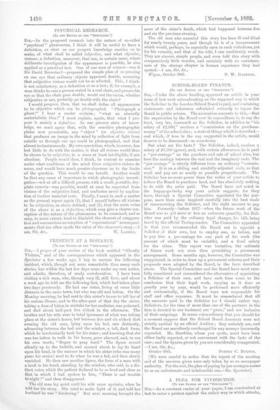SCHOOL-BOARD FINANCE. [To THE EDITOR OF THE " SPECTATOR."]
Sun—Under the above heading, appeared an article in your. issue of last week animadverting on the supposed way in which the Solicitor to the London School Board is paid, and containing. statements and inferences calculated seriously to injure the Board in public esteem. The accusation amounts to this,—that the supervision by the Board over its expenditure is, to say the' least, very lax, inasmuch as the Solicitor, in addition to "his salary of 22,000," receives a "commission on the purchase-- money" of the school sites ; a state of things which is described— and which, if true in the way suggested in the article, would deserve to be denounced—as monstrous.
But what are the facts P The Solicitor, indeed, receives a. salary of 21,500 (gross), and, with certain allowances, he is paid a "per-centage" on the purchase and sale of school sites, but here the analogy between the real and the imaginary ends. The " per-centage " is utterly different from an ordinary " commis-
sion." It is on a sliding and carefully-adjusted scale, so that work and pay are as nearly as possible proportionate. The Solicitor has no more power than the writer of your article to induce the Board to purchase land, and has absolutely nothing to do with the pries paid. The Board have not acted in the happy-go-lucky way your article suggests, for they have, through a Special Committee appointed for the pur- pose, more than once inquired carefully into the best mode' of remunerating the Solicitor, and the right amount to pay him. Formerly—before 1577—when the future work of the Board was as yet more or less an unknown quantity, the Soli- citor was paid by the ordinary legal charges, his bills being' taxed by the official Taxing-master. The Committee appointhd in that year recommended the Board not to appoint a Solicitor of their own, but to employ one, as before, and to pay him a per-centage for one part of his work (the. amount of which must be variable), and a fixed salary for the other. This report was tentative, the estimate' of future work not even then permitting a permanent arrangement. Some months ago, however, the Committee was reappointed, in order to draw up a permanent scheme, and their . proposals were adopted by the Board, in the form described above. The Special Committee and the Board have most care- fully considered and reconsidered the alternative of' appointing. a Solicitor of their own, and have each time come to the
that their legal work, varying as it does so.
greatly year by year, would be performed more efficiently and economically, if the Board were not responsible for staff and office expenses. It must be remembered that all the amounts paid to the Solicitor (or I should rather say, Solicitors, for the time of more than one of the partners in the firm is devoted to our business) are " gross," and are inclusive- of their outgoings. It seems extraordinary that you should for a moment suppose that the School Board Accounts were not strictly audited by an official Auditor ; they certainly are, and. the Board are mercilessly surcharged for any moneys incorrectly expended. Mr. Hawkins, whom you quote, must have been either badly reported, or not conversant with the facts of the case; and the figures given by you are considerably exaggerated. —I am, Sir, &c., [We were careful to notice that the report of the meeting
and of the answers given were only taken by us on newspaper authority. For the rest, the plan of paying by per-centages seems to us an unfortunate and indefensible one.—En. Spectator].


































 Previous page
Previous page